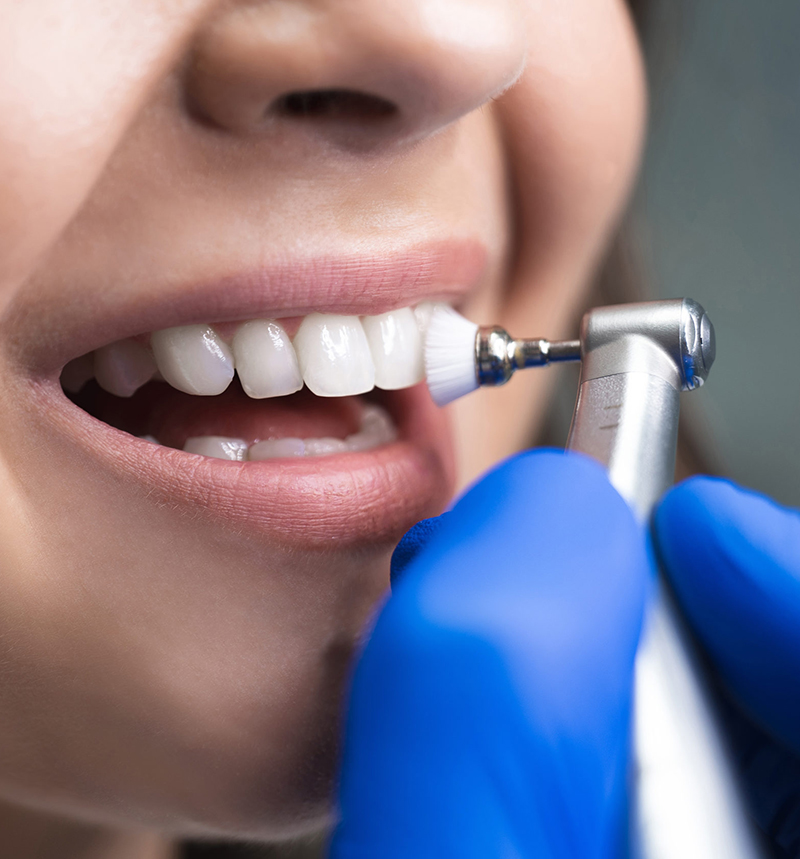Professional teeth cleaning, also known as dental prophylaxis, is a routine procedure performed by a dental hygienist or dentist to remove plaque, tartar, and stains from your teeth. It is a crucial part of preventive dental care that helps maintain good oral health and prevent dental issues such as cavities, gum disease, and bad breath.
Prevents Cavities: Removes plaque, a sticky film of bacteria that can lead to tooth decay if not properly managed.
Prevents Gum Disease: Eliminates tartar (hardened plaque) that can cause inflammation and infection of the gums, known as gingivitis or periodontitis.
Fresher Breath: Reduces bad breath caused by food particles and bacteria in the mouth.
Brightens Your Smile: Removes surface stains from your teeth, giving you a cleaner and brighter smile.
Improves Overall Health: Good oral hygiene is linked to overall health, potentially reducing the risk of conditions like heart disease and diabetes.

Examination: Your dentist or hygienist will start by examining your mouth to check for signs of dental issues such as cavities, gum disease, or oral cancer.
Plaque and Tartar Removal: Using special tools, the hygienist will remove plaque and tartar from your teeth, especially around the gum line and between the teeth. This process is called scaling.
Polishing: After scaling, your teeth will be polished with a gritty paste to remove surface stains and make your teeth smooth and shiny.
Flossing: The hygienist will floss between your teeth to remove any remaining debris and plaque.
Fluoride Treatment: In some cases, a fluoride treatment may be applied to help strengthen your teeth and protect against decay.
It is generally recommended to have your teeth professionally cleaned every six months. However, your dentist may recommend more frequent cleanings if you have specific oral health issues such as gum disease, a high risk of cavities, or if you are undergoing certain treatments.
Brush Twice Daily: Use a fluoride toothpaste and a soft-bristled toothbrush to brush your teeth for at least two minutes, twice a day.
Floss Daily: Flossing removes plaque and food particles from between your teeth and under the gum line, areas where a toothbrush can’t reach.
Use Mouthwash: An antiseptic mouthwash can help reduce plaque and kill bacteria that cause bad breath and gum disease.
Healthy Diet: Limit sugary and acidic foods and drinks that can contribute to tooth decay and erosion. Eat a balanced diet rich in fruits, vegetables, and dairy products.
Stay Hydrated: Drink plenty of water throughout the day to help wash away food particles and bacteria.
A: Teeth cleaning is generally not painful. You may feel some discomfort or sensitivity during the procedure, especially if you have gum inflammation or sensitive teeth. Your hygienist can make adjustments to ensure your comfort.
A: A typical teeth cleaning appointment lasts about 30 to 60 minutes, depending on the amount of plaque and tartar buildup and the specific treatments needed.
A: No, professional teeth cleaning is safe and beneficial for your teeth. It helps maintain your oral health and prevents the buildup of harmful plaque and tartar.
A: After a teeth cleaning, continue with your regular oral hygiene routine. You may be advised to avoid eating or drinking for 30 minutes if you received a fluoride treatment. If you experience any sensitivity, it should subside within a few days.
A: Yes, professional cleaning is necessary even if you maintain good oral hygiene at home. It removes plaque and tartar buildup that regular brushing and flossing can’t reach, ensuring comprehensive oral care.